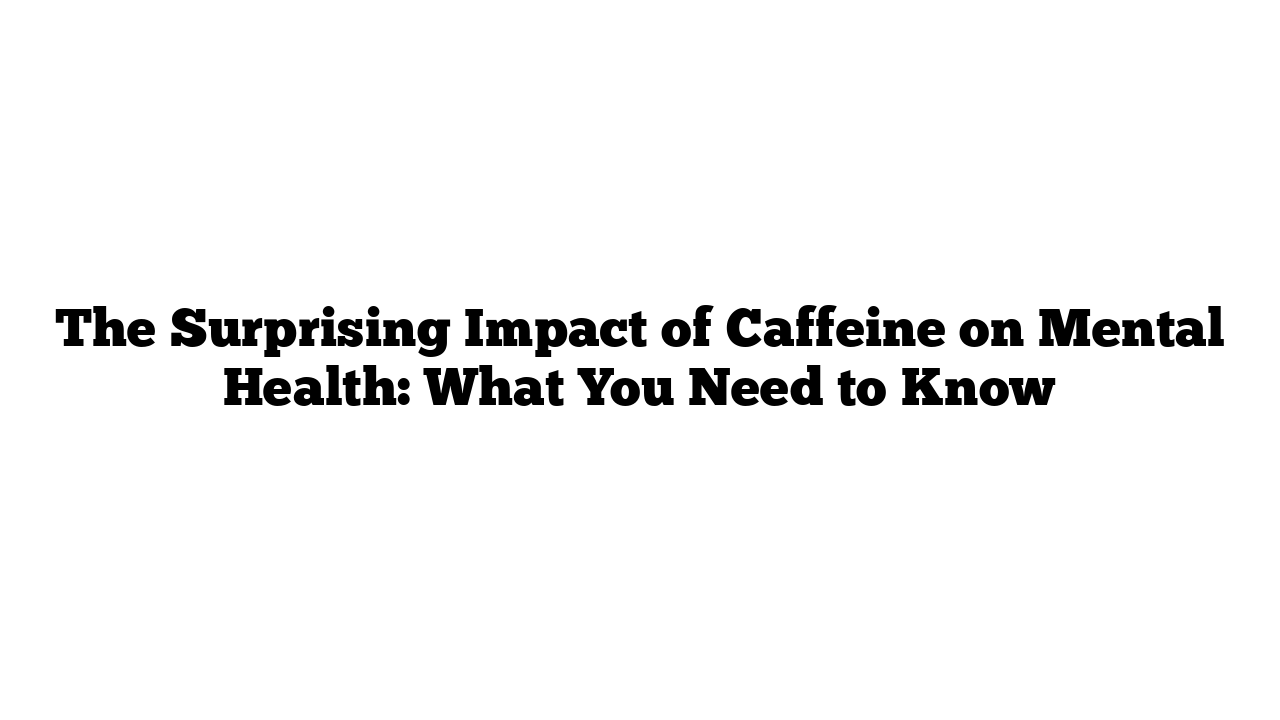The Surprising Impact of Caffeine on Mental Health: What You Need to Know
Are you a fan of that morning coffee or tea? You’re not alone! In the USA and worldwide, caffeine is one of the most commonly used substances. It’s affordable, easy to find, and delivers consistent results—more energy, better focus, and sharper attention. But while caffeine provides some clear perks, there’s a lot more to consider when it comes to how it affects your mental health.
What Exactly is Caffeine?
Caffeine, a natural stimulant, is found in coffee, tea, soft drinks, chocolate, and even some ice creams and energy-boosting gums. When consumed, caffeine stimulates the central nervous system, making us feel awake and energized. Its effects can last several hours as the body absorbs it and processes it in the liver. However, each person’s response to caffeine can differ based on their metabolism and sensitivity to stimulants.
Caffeine’s Surprising Link to OCD (Obsessive-Compulsive Disorder)
For individuals with OCD, caffeine might offer some unexpected benefits. According to recent studies, caffeine may help shift focus away from obsessive thoughts and compulsive behaviors. Some people with OCD find that caffeine gives them the energy to better manage and direct their attention, allowing a temporary reprieve from these thoughts.
However, it’s important to note that caffeine isn’t a cure. It’s a tool that may provide temporary relief for some individuals with OCD, helping them focus on other tasks rather than their obsessive thoughts.
Caffeine’s Role in Boosting Mood
Caffeine interacts with various brain receptors that promote wakefulness and alertness by blocking chemicals that make us feel tired. Plus, it stimulates the release of dopamine, a hormone linked to feelings of happiness and well-being. For many people, this boost can help lift low moods, especially when feeling fatigued or down.
A study involving 44,000 men found that drinking two to three cups of coffee daily was associated with a 50% reduction in suicide risk. This doesn’t mean caffeine is a replacement for mental health treatments, but it does highlight its potential mood-enhancing effects.
Can Caffeine Help Prevent Dementia?
There’s emerging research suggesting that caffeine may play a role in reducing the risk of dementia. One study reviewed caffeine intake among people with mild memory problems and found that those who did not develop dementia had twice as much caffeine in their blood. However, more research is necessary to confirm these findings, so don’t rely solely on caffeine as a preventive measure.
Caffeine’s Dark Side: Anxiety
If you have an anxiety disorder, be cautious with caffeine. Consuming large amounts can worsen symptoms of anxiety, panic attacks, and social anxiety by putting your brain in “hyperdrive.” Excess caffeine increases heart rate, which can heighten feelings of nervousness and may lead to overthinking.
For those prone to anxiety, it’s generally recommended to moderate caffeine intake or avoid it altogether if it triggers heightened symptoms.
Sleep Disruption and Caffeine
We often rely on caffeine to stay alert, but it can also make it hard to unwind. Caffeine can remain active in the body for hours, leading to sleep disturbances and insomnia if consumed later in the day. Try to enjoy your coffee in the morning and set a cutoff around noon if you struggle with sleep.
Caffeine Withdrawal
What happens when you try to cut back? If you’re accustomed to high levels of caffeine, reducing your intake can lead to withdrawal symptoms such as headaches, fatigue, and trouble concentrating. Many people find they’re dependent on caffeine simply to avoid these side effects.
Tips to Reduce Caffeine Intake
If you’re considering cutting back on caffeine, here are some effective tips:
- Gradually Delay Your Morning Coffee: If you usually drink coffee at 8 a.m., try pushing it to 9 or even 10 a.m. Eventually, you may reach a point where you don’t crave it as strongly in the morning.
- Reduce Serving Sizes: Start by drinking 75% of your usual cup, then cut back to 50%, and so on.
- Make Your Own Coffee: This helps you control portions and avoid the habit of buying larger sizes at coffee shops.
- Drink Coffee Only When You Need a Boost: Save it for times when you truly need to focus, like for a big project or presentation.
Find What Works Best for You
Moderation is essential. While caffeine can boost energy, alertness, and even mood, overuse can lead to negative side effects. So, listen to your body and take note of how caffeine makes you feel.
“Caffeine is a friend in moderation and a foe in excess.”
For more insights on maintaining mental health, visit medicaltimes.io for additional articles.
Wishing you the best on your journey to balanced caffeine use and mental well-being.
